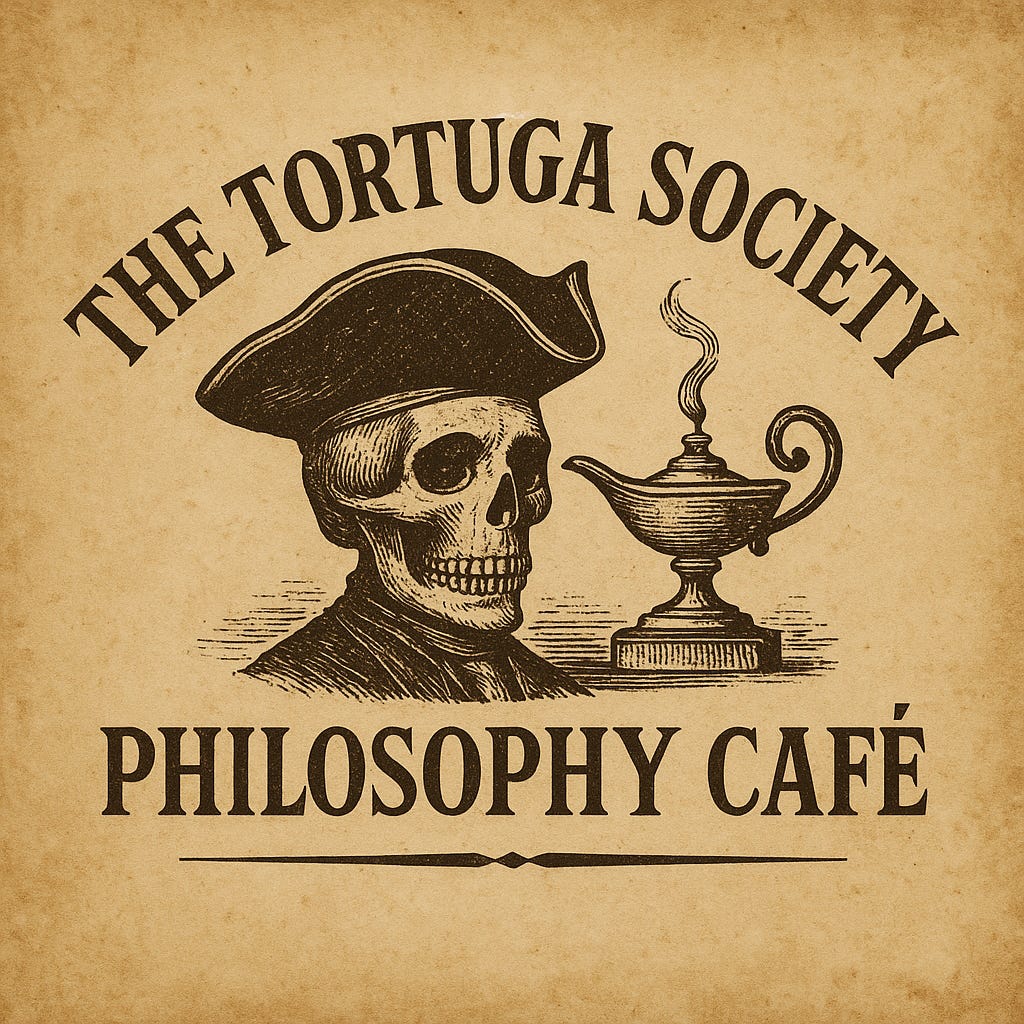Introducing The Tortuga Philosophy Café
Lost Philosophies, CIA Academics, & A Community of Gentleman Scholars
INTRODUCING: The Tortuga Philosophy Café
I am here today to announce the start of the Tortuga Society’s Philosophy Café.
Twice monthly, on Saturday at 5PM US/Eastern Saturday at 2pm EST1, I will be leading a 90 minute, salon-style call where a group of us will gather to discuss the mysteries of the universe. Our first session will be on November 1st.
I have only been a member of the Tortuga society for a short while, and my experience here has been nothing short of amazing. In a world where everyone is drowning in a sea of slop, the Tortuga Society seems an ark for the ambitious.
The topic I’ve settled on is a big one: Man. Not man as in human male, but MAN as that more weighty term for “person.” This might not be in lockstep with the times, but that is one of the benefits of the Tortuga Society: we can move where we want, irrespective of what direction the wind may be blowing the times. I for one like the word “man” when used in this gender neutral sense. It has a certain power and dignity that words like “human” lack. In fact, from an etymological standpoint, “human” just means “of man,” which may be a connection we explore2.
As it turns out, much of one’s worldview depends upon how one answers this question. Is man a rational animal (as the ancients thought) or a child of god (as the Christians believed)? Is he a machine, an animal, a computer program? The answer here will inform what kind of ethos one has and, as a result, the kind of life one lives.
Such a topic is broad enough to appeal to many people and allows us the flexibility to fixate upon the interests of individual members. During this first month, I expect to cover a broad cluster of possible positions, and then we will decide which questions our members find most interesting.
The first reading will be from Ernst Cassirer’s An Essay on Man. Cassirer is part of the lost philosophical tradition and deserves to be more widely read. His final book is also an excellent introduction to the problems we will be dealing with, as it is written in a clear manner and is rife with historical information that can serve as jumping-off points for discussion.
But there is another aspect to our club, one which I will only tease for our non-members.
The Hidden Tradition: The CIA and the Scientific Elite
It seems that the question of Man is not only of interest to me and other curious people; certain individuals with ties to intelligence networks also appear to have an interest in understanding the fundamental nature of the human being. The reason for this is that the kind of view you have regarding the nature of man dictates the kinds of norms and values that are part of society. If someone wanted to engineer a certain kind of society, it would make sense that they try to understand the nature of man—and perhaps that they would even try to push a theory that aligns with their vision.
I have long suspected that there is some crazy stuff out there with respect to philosophy. After the National Securities Act of 1947, intelligence agencies like the CIA were able to do stuff without congressional oversight, which led to vast sums of money being laundered and many projects that most would consider highly unethical. Even to this day the Pentagon “loses” like a couple billion dollars a year or something crazy. If they could afford to run crazy programs like Stargate, then there must be some stuff on real philosophical problems—or so the thinking goes.
It turns out I was right. After some digging, I found the goods. In the 70s a group of scientists came together to research our topic, and some members had ties to organizations which seem to be CIA fronts (but one rarely knows for certain with this stuff). Together they wrote a very interesting book on all this, a book that was initially published privately, ostensibly because “it did not fall under any marketing categories that publishers conventionally use.” But it was eventually picked up by Pergamon Press.
Those in the know might already see where I am going: Pergamon press was owned by Robert Maxwell, as in Ghislaine Maxwell’s father. I will not be going into the details of Robert Maxwell. It is just one more interesting connection between the work of these people and intelligence networks.
But things like this may not be so sinister as they appear, either. Today Palentir, which began as a CIA project and perhaps still is, has a whole YouTube channel devoted to applied ontology; and their stuff seems to me to be different from what people are doing in academia. To my knowledge, similar projects are being pursued out of the University of Buffalo, which might be thought of as an open-source Palentir in the future—but that is a topic for another essay. As it turns out, if you want to do something in the world, you often need some kind of overarching philosophical framework to facilitate that. The fact that the CIA and other intelligence agencies might have funded projects like this ought not surprise us. It’s also unsurprising that many academics would have affiliations with intelligence agencies. Although it may have a certain sexiness, all this stuff is rather mundane in reality. Somebody once suggested that I ought to consider applying for a certain CIA post-doc, which apparently is very well funded. This wasn’t a secret invitation to join an underground network like SPECTRE; it was just proposed as a smart career move.
It might seem, then, that all this is rather routine. It’s just scientists studying topics that are of interest to those in the intelligence community. That would be the case if it weren’t for the fact that this book contains many passages which, frankly, are completely crazy. Although much of it is rather tame—and useful for the study of our topic, too—the contributors speak about certain aberrant phenomena with an openness that astounds me. For example, there is a footnote from a physicist with a PhD from Yale, which says that Boeing conducted studies on telekinesis (wtf?). And the further one digs, the weirder it gets. It’s unlike anything I’ve come across in other academic works, and I am still trying to put the pieces together.
I have not done a deep dive into all the characters that comprise this little world, but it seems to me like they had their own little philosophical movement—a secret movement which worked within the structures of academia (the book in question is from a tier-1 university) but which seems hermetically sealed off from the rest of the field. All of this is very perplexing, and I need help in deciphering it.
This way we can take out two birds with one stone: we can investigate the nature of man and begin uncovering the secrets of this strange group.
That is all I will say for now. If it sounds interesting, I would suggest that you join us. More details (and PDFs) will be provided to members of the Tortuga society — the Philosophy Café is included free with membership. Those of you who are still on the outside can pay for a session here (stripe) or here (PayPal) if you’d like to join us.
—Krug
I will be ensuring that this time works for our attendees. If there is enough popular demand to move the time (and/or the date), I will move it.
And I have a visceral revulsion to the contemporary habit of using the word “humans.” Imagine the preamble of the US Constitution beginning with the phrase “We the humans…” I find it disgusting, actually.




Gonna start my transition so I can join the philosophy club. Get ready, boys. Call me Alirp. Sounds more masculine, but in a mystical Eastern European way.
This sounds fun. So we could pick and choose which sessions we'd like to join as non-members? If so, I'd def like to join if you do something on Nietzsche, Stoicism, or Plato.